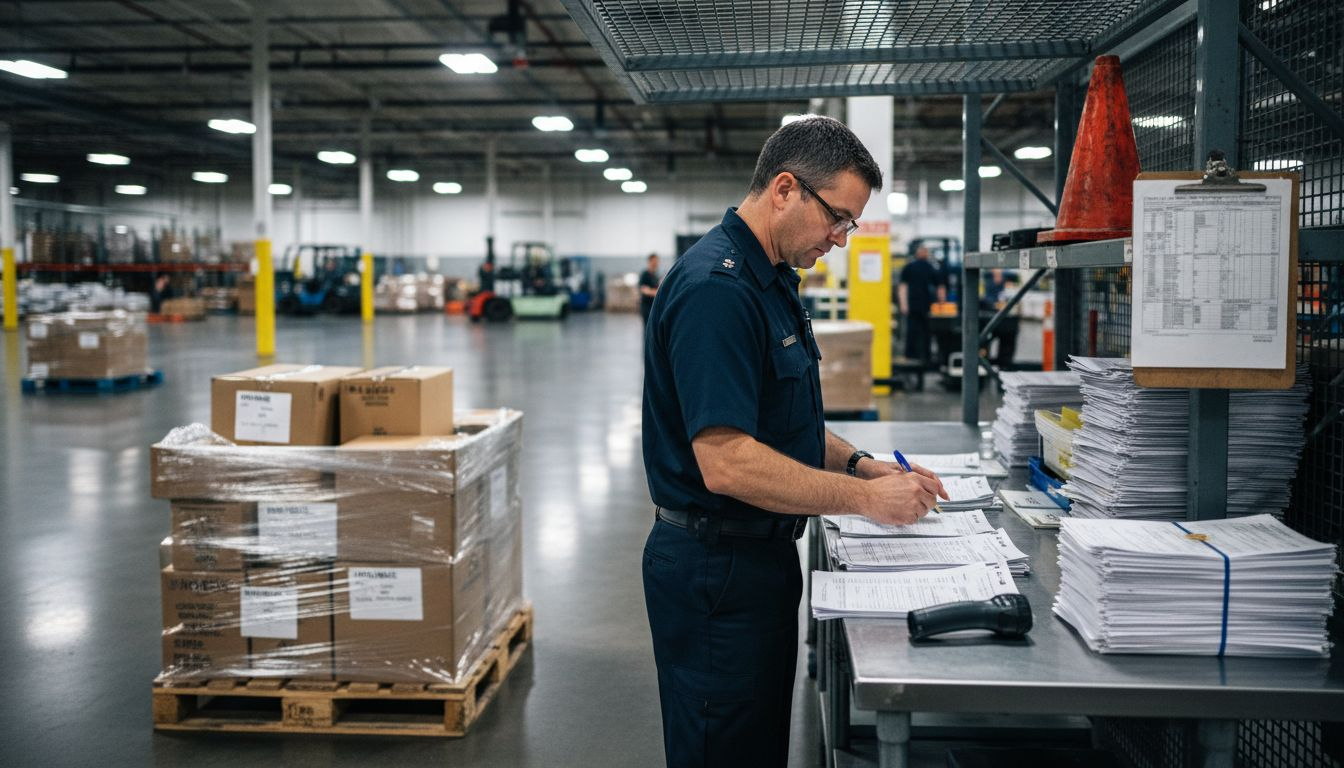Customs bonds might sound like just another piece of paperwork in international trade but they carry far more weight than most realize. Imagine this: over $19.2 billion in import duties were secured by customs bonds in the US last year alone. Most people focus on shipping logistics and taxes yet forget that without customs bonds none of those goods clear the border. This single contract can make or break an entire global shipment.
Table of Contents
- What Are Customs Bonds And Their Purpose?
- Why Customs Bond Types Are Essential For Importers
- Different Types Of Customs Bonds Explained
- How Customs Bonds Work In International Shipping
- Key Considerations When Choosing A Customs Bond Type
Quick Summary
| Takeaway | Explanation |
|---|---|
| Customs bonds are essential for importers. | They provide financial guarantees required for duties, taxes, and compliance with import regulations. |
| Choose the right bond type based on trade needs. | The bond type should reflect transaction frequency, cargo complexity, and financial exposure for more effective management. |
| Single-entry and continuous bonds serve different purposes. | Single-entry bonds suit one-time shipments, while continuous bonds cover multiple transactions for regular importers. |
| Evaluate risks before selecting a bond. | Consider annual import volume and potential liabilities to match bond types to industry-specific requirements effectively. |
| Proper bond selection minimizes compliance risks. | Understanding bond characteristics helps businesses streamline processes and reduce financial risk during international trade. |
What Are Customs Bonds and Their Purpose?
Customs bonds serve as critical financial guarantees in international trade, ensuring government agencies receive required payments and protecting national economic interests. These legally binding agreements function as a contractual promise between importers, customs authorities, and surety companies that all regulatory obligations will be met during cross border transactions.
Understanding the Fundamental Role of Customs Bonds
A customs bond represents a specialized insurance mechanism that provides financial protection for government revenue and regulatory compliance. U.S. Customs and Border Protection defines these instruments as contractual agreements designed to safeguard potential duties, taxes, and penalties associated with international shipments.
The primary purposes of customs bonds include:
- Guaranteeing payment of import duties and taxes
- Ensuring compliance with import regulations
- Protecting government revenue streams
- Mitigating financial risks for customs authorities
Types of Financial Protection
Customs bonds essentially create a safety net that shields government agencies from potential financial losses. When an importer purchases a bond, they are essentially providing a financial guarantee that all required payments will be made and all regulatory requirements will be fulfilled. Should an importer fail to meet their obligations, the surety company backing the bond will cover the outstanding financial responsibilities.
Discover more about our comprehensive customs bond services to ensure seamless international trade transactions. By understanding and utilizing these critical financial instruments, businesses can navigate complex international shipping regulations with confidence and minimize potential compliance risks.
Why Customs Bond Types Are Essential for Importers
Customs bond types play a pivotal role in international trade, offering importers strategic financial protection and regulatory compliance mechanisms tailored to their specific business needs. Understanding these nuanced instruments helps businesses navigate complex international shipping requirements while managing potential financial risks.
Strategic Risk Management Through Bond Selection
U.S. Customs and Border Protection recognizes that different import scenarios require specialized bonding approaches. Importers must carefully select bond types that align with their transaction frequency, cargo volume, and potential financial exposure.
Key considerations for bond type selection include:
- Transaction volume and frequency
- Potential duty and tax liability
- Complexity of import regulations
- Financial risk tolerance
- Specific industry requirements
Matching Bond Types to Business Needs
Customs bonds are not one-size-fits-all solutions. Importers must evaluate their unique operational landscape to determine the most appropriate bond type. Single-entry bonds work well for infrequent or one-time imports, while continuous bonds provide comprehensive coverage for businesses with regular international shipments.
Learn about our comprehensive import documentation services to complement your customs bond strategy. By understanding the intricate relationship between bond types and import regulations, businesses can optimize their international trade operations and minimize potential financial and regulatory challenges.
Different Types of Customs Bonds Explained
Customs bonds represent complex financial instruments with multiple variations designed to accommodate diverse international trade scenarios. Understanding these different bond types enables importers to select the most appropriate protection mechanism for their specific shipping and regulatory requirements.
Below is a comparison table summarizing the main types of customs bonds, highlighting their core characteristics and appropriate use cases for importers.
| Bond Type | Purpose | Typical Users | Coverage Duration | Best For |
|---|---|---|---|---|
| Single-Entry Bond | Guarantees for one-time import transactions | Occasional importers | One shipment | One-time or infrequent imports |
| Continuous Bond | Covers multiple shipments over time | Regular/import-intensive businesses | Typically one year | High-frequency or ongoing import activities |
| Drawback Bond | Covers duty refunds on re-exported merchandise | Exporters seeking duty drawbacks | Varies | Businesses re-exporting imported goods |
| Foreign Trade Zone Bond | Enables special economic zone regulations | Users of Foreign Trade Zones | Varies | Imports under Foreign Trade Zone procedures |
Primary Categories of Customs Bonds
U.S. Customs and Border Protection recognizes several fundamental customs bond classifications that serve distinct purposes in international trade transactions. These specialized instruments provide targeted financial guarantees and regulatory compliance mechanisms.
The main categories of customs bonds include:

- Single-Entry Bonds: Designed for one-time import transactions
- Continuous Bonds: Providing comprehensive coverage for multiple shipments
- Drawback Bonds: Facilitating duty refunds for re-exported merchandise
- Foreign Trade Zone Bonds: Enabling special economic zone import regulations
Detailed Bond Type Characteristics
Single-Entry Bonds are ideal for businesses with infrequent international shipments, covering specific import transactions with precise monetary guarantees. These bonds represent a targeted approach for companies making occasional cross-border purchases.
Continuous Bonds offer broader protection, typically valid for one year and covering multiple shipments. Businesses with regular international trade activities benefit from these comprehensive financial instruments that streamline customs compliance processes.

Learn more about managing customs duties effectively to complement your bond selection strategy. By understanding the nuanced characteristics of different customs bond types, importers can optimize their financial risk management and regulatory compliance strategies.
How Customs Bonds Work in International Shipping
Customs bonds function as complex financial guarantees that enable smooth international trade transactions by providing comprehensive protection for government agencies, importers, and shipping entities. These specialized instruments create a structured framework for managing financial risks and regulatory compliance across cross border shipments.
The Mechanics of Customs Bond Transactions
U.S. Customs and Border Protection describes customs bonds as intricate three-party agreements involving the importer, customs authority, and a surety company. The bond essentially serves as a financial promise that all legal and monetary obligations will be fulfilled during the import process.
Key operational components of customs bonds include:
-
Establishing financial guarantees for potential duties and taxes
-
Ensuring regulatory compliance with import regulations
-
Providing legal assurance for cargo release
-
Mitigating potential financial risks for government agencies
Risk Management and Financial Protections
Customs bonds operate as a critical risk mitigation tool in international shipping. When an importer purchases a bond, they are creating a financial safety net that protects against potential defaults, regulatory violations, or unexpected financial liabilities. The surety company backing the bond assumes responsibility for covering any outstanding financial obligations should the importer fail to meet their commitments.
Explore our comprehensive customs clearance services to gain deeper insights into navigating complex international shipping regulations. By understanding the intricate mechanisms of customs bonds, businesses can develop more robust and compliant international trade strategies.
Key Considerations When Choosing a Customs Bond Type
Selecting the appropriate customs bond requires a strategic assessment of a company’s unique international trade profile. The right bond type can significantly impact financial risk management, regulatory compliance, and overall shipping efficiency for businesses engaged in global commerce.
Evaluating Business Import Characteristics
U.S. Customs and Border Protection emphasizes the importance of matching bond types to specific import patterns and operational requirements. Importers must conduct a comprehensive analysis of their shipping frequency, cargo complexity, and financial exposure.
The following table outlines key factors to consider when selecting a customs bond, helping businesses align bond types with their specific import characteristics and risk profiles.
| Consideration | Impact on Bond Selection |
|---|---|
| Annual Import Volume | Higher volume may favor continuous bonds for cost efficiency |
| Frequency of Shipments | Frequent shipments generally require continuous bond coverage |
| Expected Duty/Tax Liability | Larger liabilities may necessitate higher bond coverage limits |
| Complexity of Merchandise | Complex goods or regulations may influence bond requirements |
| Industry-Specific Regulations | Certain industries require tailored bond types |
| Financial Risk Tolerance | Businesses with higher risk aversion may opt for broader bonds |
Critical factors influencing bond type selection include:
- Annual import transaction volume
- Total expected duty and tax liability
- Frequency of international shipments
- Complexity of imported merchandise
- Industry-specific regulatory requirements
- Financial risk tolerance
Financial and Regulatory Risk Assessment
Continuous bonds provide the most flexible protection for businesses with regular international shipping activities. These bonds offer year-round coverage, typically with higher monetary limits that accommodate multiple transactions. Small to medium enterprises with consistent import volumes benefit from the comprehensive protection and streamlined compliance these bonds provide.
Single-entry bonds work best for companies with occasional or one-time international shipments. They offer targeted financial protection for specific transactions, allowing businesses to manage costs more precisely without committing to long-term bonding arrangements.
Discover our comprehensive import documentation guidance to further support your customs bond strategy. By carefully evaluating these key considerations, businesses can select the most appropriate bond type to optimize their international trade operations.
Take Control of Your Customs Bond Strategy with the Experts at Worldwide Express
Choosing the right customs bond type can make or break your international shipping success. If you are feeling the pressure of complicated bond choices and need a secure path through customs regulations, Worldwide Express is here to help. Our experience in customs brokerage and compliance means your shipments get the professional attention they deserve, letting you focus on business growth.

Stop letting uncertainty over customs bonds cause expensive delays or compliance headaches. Visit Worldwide Express to explore how our tailored solutions support your entire shipping process, from documentation and insurance to tracking and warehousing. Get the clarity and confidence you need—start by connecting with our specialists through our Uncategorized Services page. Act now to ensure your next international shipment moves forward smoothly and complies with every regulation.
Frequently Asked Questions
What are customs bonds and their purpose?
Customs bonds are financial guarantees in international trade that ensure government agencies receive required payments, protecting national economic interests. They serve as a promise to meet regulatory obligations during cross-border transactions.
What types of customs bonds are available for importers?
There are several types of customs bonds including Single-Entry Bonds, Continuous Bonds, Drawback Bonds, and Foreign Trade Zone Bonds, each designed for specific import scenarios and financial protection needs.
How do I choose the right customs bond type for my business?
Selecting the appropriate customs bond type depends on factors such as transaction volume, potential duty and tax liability, complexity of import regulations, and your specific financial risk tolerance.
What is the difference between single-entry bonds and continuous bonds?
Single-Entry Bonds are designed for one-time import transactions, providing targeted financial protection for specific shipments, while Continuous Bonds cover multiple shipments over a year, offering broader compliance and financial protection for businesses with regular international trade activities.
Recommended
- Secure Your Shipments with Reliable Customs Bond Services – Worldwide Express, Inc.
- Understanding Bill of Lading Types in Trade Transactions – Worldwide Express, Inc.
- How to Pay Customs Duties: A Step-by-Step Guide – Worldwide Express, Inc.
- Understanding What is Customs Valuation for Trade – Worldwide Express, Inc.






